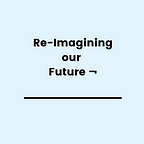Re-Imagining Participative Democracy
Why do democracies fail and nations decline?
Cicero’s analyses and reflections led him to conclude that the Roman Empire’s decline was a result of a decline of morality and ethics, beginning with leadership. Extravagant spending, a lust for wealth, abuses of power by corrupt officials at all levels of government, as self-interest overrode public interest, individual rights were trampled on — fuelled the moral decline. Tinkering (too little and too late) happened when radical transformation was needed.
French historian Alexis de Tocqueville’s 19th century assessment of democracy (which he favoured) included an honest assessment of its shortcomings — including inefficient, incompetent and corrupt public officials, wealth and power elitism. He also pointed out the potential ‘tyranny of the majority’.
We need look no further for answers.
WHAT ACTIONS CAN WE TAKE — RE-IMAGINING STICKS AND CARROTS?
When power, wealth, education and wellbeing imbalances become too wide, we land in big trouble as a collective.
Stick. It would be good to see parliamentarians, politicians and public officials:
- Consistently and directly held to account and taken to task for failure to deliver on campaign promises and required delivery to their electorate
- Forced to immediately resign and pay their debt to society when caught in misdemeanours, corruption, falsehoods and other unethical behaviour
- Castigated for focusing on their careers and self-interest instead of serving the interests of citizens who elected them for a different purpose
- Prohibited from taking certain decisions or being allowed to tamper with national constitutions, even under emergency conditions, without recourse to those who elected them
Carrot. It would also be good to see the application of consultative, systemic knowing to important challenges and issues. In an increasingly complex world, citizen engagement and the mobilising of a range of expertise, knowledge and wisdom. This is becoming increasingly essential.
This consultative approach will be easier to implement in institutions and organisations than at nation-state level — where any determined effort by government and influential power-holders to entrench their power, and existing wealth, education and other gaps, and vested interests will make it extremely challenging to achieve the required wide representation, participation and collective results.
But ways can be found once the right intent is there.
Carol Mueller, in her chapter Ella Baker and the origins of ‘Participatory Deomocracy’, highlights the story of the African-American activist Ella Josephine Baker, and the origins of participatory democracy. Below are the core components, as described by Mueller:
“The emphasis on participation had many implications, but three have been primary: (1) an appeal for grassroots involvement of people throughout society in the decisions that control their lives; (2) the minimization of hierarchy and the associated emphasis on expertise and professionalism as a basis for leadership; and (3) a call for direct action as an answer to fear, alienation, and intellectual detachment…”
Lead Author: Graham Williams
Graham is the author of the book The Halo and the Noose, the Power of Storytelling and Story Listening in Business Life. Graham offers a series of workshops ranging from applying Da Vinci for personal growth to exploring African Stories. You can reach out to Graham through his website and/or via e-mail, centserv@iafrica.com.
Anchor Author: Daniel Rudolph (just minor edits in this post)
Daniel Rudolph is interested in exploring alternative, experiential learning opportunities for people of all ages. He is passionate about forming community, and building public spaces for meaningful, transformational gathering. Currently he is spending a lot of his time learning juggling and facilitating gatherings. He also enjoys writing and sharing poetry.
Dan, and a small team, are in the process of publishing a series of articles titled ‘Live Human Signposts’ that showcases individuals that have taken alternative paths to higher education and/or are pursuing regenerative livelihoods, which is being commissioned by the Ecoversities Alliance. In March, Dan will begin an apprenticeship in Vermont at the MAPLE Monastic Academy.
